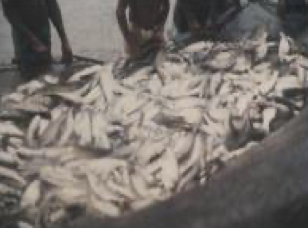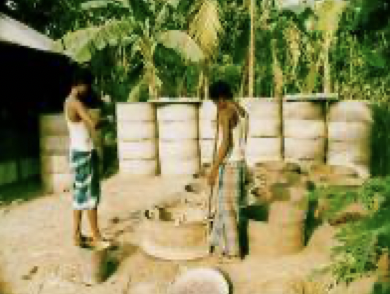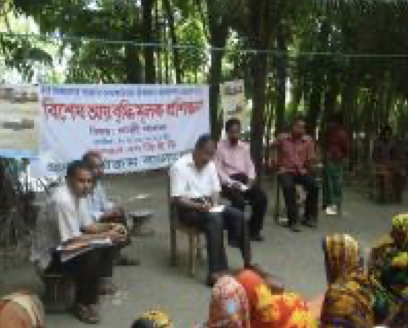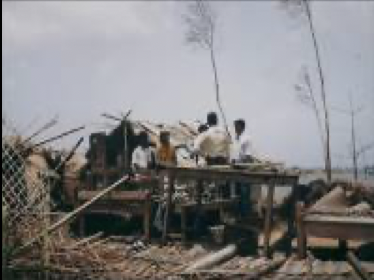Previous Program
Duckweed based Urban Wastewater Treatment
Duckweed based Urban Wastewater Treatment
PRISM Bangladesh has implemented the community based urban wastewater treatment project in Khulna City Corporation Area, one of the major components of Sustainable Environmental Management Program under NEMAP.
The main objectives of this Program were:
- To mobilize, motivate and train the communities on environmental issues and wastewater treatment, solid & hospital waste management aspects.
- Introduce and adopt appropriate preventive measures and practices at the sources of wastewater, solid & hospital waste generation.
- Identify and isolate various solid waste and wastewater generated according to their composition at the source and institute separate collection systems.
- Improve the general nutritional level of the population by increasing protein production.
- Improve community environmental sanitation and general health of people.
- Community managed, operated and maintained waste management systems which are commercially sustainable.
- Manufacture compost from the collected organic solid waste.
- Formulate groups with the vulnerable communities in manufacturing compost from solid waste to establish the income generation activities among them.
- Develop marketing network for compost.
- Clinical waste management through a scientific process to avoid health hazards for the community.
- Develop leadership quality of the environmental management committee to operate and develop the environmental condition in the city areas.
Integrated wastewater treatment and Aquaculture
Integrated wastewater treatment and Aquaculture
The Duckweed technology has been introduced to achieve high production of fish feed and fish utilising fallow rural water bodies and other resources like unproductive labor and rural wastewater. Group formation, mobilisation, training and credit management support is ensured to the rural beneficiaries for promotion of pisciculture to form rural enterprises by mobilising target marginal farmers and women. A number of scientific researches have conducted by the scholars from different countries on this issue based on PRISM’s field activities. The programme was financed by UNCDF, MISEREOR and UNDP.
Intensive Sanitation and Hygiene Promotion
Intensive Sanitation and Hygiene Promotion
Bangladesh is one of the densely populated countries in the developing world. Very low sanitation coverage causes enormous environmental health problems for the rural population in Bangladesh. PRISM was involved to increase this coverage substantially to more than 80% of the population in the programme area through social mobilization and interpersonal hygiene education.
PRISM implemented the facilitation, construction and installation of twin pit latrine program in the Khulna Municipal Area, which was undertaken by LGED.
The objectives of the program were to:
(a) raise the sanitation coverage in the city specially in the slum areas
(b) increase the awareness of the communities on sanitation
(c) minimize environmental pollution
(d) reduce infectious diseases and prevent bad odour in the city
(e) stop night soil collection
(f) get rid of bucket latrines.
Arsenic Mitigation Water Supply Project
Arsenic Mitigation Water Supply Project
PRISM implemented the screening and mitigation activities and community mobilization program in Jhalakathi Sadar Thana of Jhalakathi District to supply arsenic free drinking water under Bangladesh Arsenic Mitigation Water Supply Project (BAMWSP). Water samples were collected from all the installed tube wells and was tested using Arsenic Field Test Kits. In addition, some other metals such as Chlorides, Irons, and Manganese were also tested in the PRISM’s lab. Consequently the community development, mobilization and execution activities have also been carried out in the same area. Now, the people of the affected area are getting safe drinking water as the project has installed different types of arsenic free water supply arrangement.
Market Infrastructure Development Project in Charland Region (MIDPCR)
Market Infrastructure Development Project in Charland Region (MIDPCR)
PRISM has successfully completed MIDPCR financed by IFAD, the Netherlands Government and Bangladesh Government. The Project has been executed by Local Government Engineering Department (LGED). This project was mainly focused on social awareness emphasis on women members with a view to their sustainable development. PRISM has implemented this capacity building programme in its micro-finance working area in the coastal zone of Bangladesh such as Lakshmipur and Noakhali. In this programme, 400 training session on social issue where total participants were 7865, 466 training session on IGA where total participants were 13879 and 92 training session on exchange visit where total participants were 2753.
Disaster Management Program
Disaster Management Program
PRISM implemented the Disaster management program in collaboration with CARE Bangladesh as a Partner in Manikganj District involving the local community , leaders , and elites , professional , etc., to make the local people aware about natural disaster and hazards that occur and how to combat the situation during and post disaster.
Development of Ward Level Solid Waste Management Program and composting
Development of Ward Level Solid Waste Management Program and composting
PRISM initiated ward level solid waste management program with the support of JICA Study Team in Dhaka City Corporation Areas, which is the replication of the experience established in Khulna City Corporation. In this management community people participating in the management process and they are collectively organising the management activities. We have developed the leadership quality and institutional arrangement through long term discussion, meeting, training, experience sharing and on job practical orientation with equipment and logistic support.
The system consists of safe collection and disposal introducing door-to-door collection and disposing to KCC secondary collection point providing all logistic supports. 72 numbers of collection vans were involved for collecting solid waste through community participation covering 26 wards out of 31 wards of Khulna City. 17 local level NGOs/CBOs were involved in the service of solid waste. PRISM constructed four compost plants in suitable places in four KCC wards. Collected waste was converted into compost as an organic resource leading to safe management of household waste.




